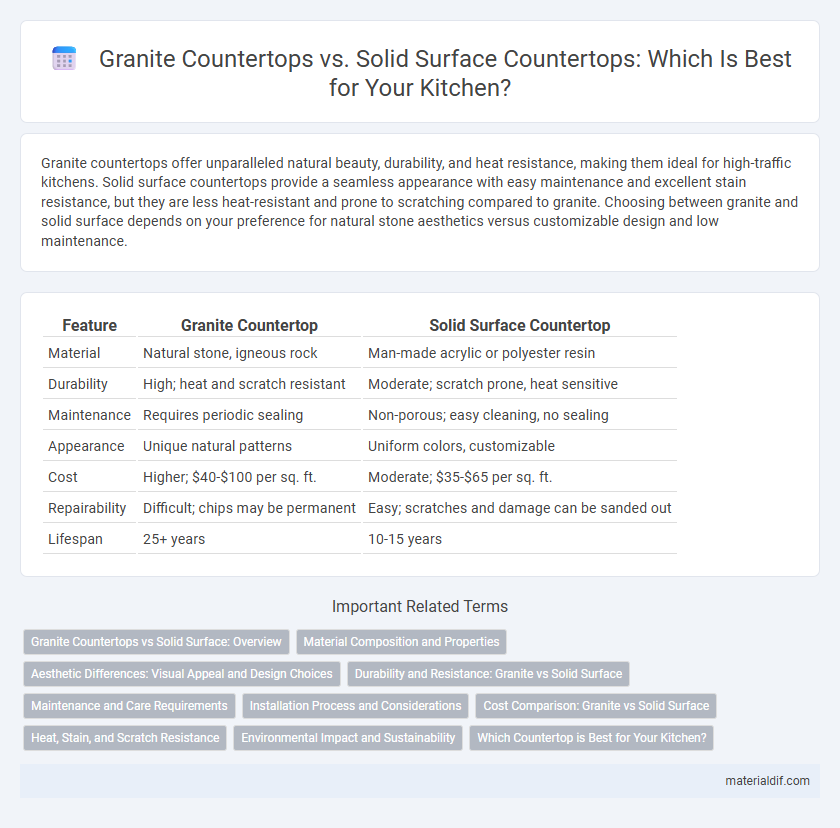Granite countertops offer unparalleled natural beauty, durability, and heat resistance, making them ideal for high-traffic kitchens. Solid surface countertops provide a seamless appearance with easy maintenance and excellent stain resistance, but they are less heat-resistant and prone to scratching compared to granite. Choosing between granite and solid surface depends on your preference for natural stone aesthetics versus customizable design and low maintenance.
Table of Comparison
| Feature | Granite Countertop | Solid Surface Countertop |
|---|---|---|
| Material | Natural stone, igneous rock | Man-made acrylic or polyester resin |
| Durability | High; heat and scratch resistant | Moderate; scratch prone, heat sensitive |
| Maintenance | Requires periodic sealing | Non-porous; easy cleaning, no sealing |
| Appearance | Unique natural patterns | Uniform colors, customizable |
| Cost | Higher; $40-$100 per sq. ft. | Moderate; $35-$65 per sq. ft. |
| Repairability | Difficult; chips may be permanent | Easy; scratches and damage can be sanded out |
| Lifespan | 25+ years | 10-15 years |
Granite Countertops vs Solid Surface: Overview
Granite countertops offer exceptional durability, natural stone aesthetics, and resistance to heat and scratches, making them a preferred choice for kitchen surfaces. Solid surface countertops, composed of acrylic or polyester blends, provide seamless integration and easy maintenance but lack the natural stone's heat resistance and unique patterns. Granite's natural composition ensures each slab is unique, enhancing kitchen design with organic textures and superior longevity compared to synthetic solid surfaces.
Material Composition and Properties
Granite countertops consist of natural igneous rock composed primarily of quartz, feldspar, and mica, offering exceptional hardness and heat resistance. Solid surface countertops, made from engineered materials like acrylic or polyester resins combined with alumina trihydrate, provide a non-porous, seamless surface that resists stains and allows easy repair. The inherent durability and unique natural patterns of granite contrast with the customizable color options and uniform appearance of solid surface materials, influencing maintenance and longevity.
Aesthetic Differences: Visual Appeal and Design Choices
Granite countertops showcase natural stone patterns with unique veining and color variation, offering a luxurious and timeless aesthetic that enhances kitchen elegance. Solid surface countertops provide a uniform appearance with a wide range of colors and patterns, allowing for seamless integration and modern, customizable design options. The choice between granite's organic, textured beauty and solid surface's smooth, consistent look depends on desired visual impact and style preferences.
Durability and Resistance: Granite vs Solid Surface
Granite countertops offer exceptional durability and resistance to scratches, heat, and stains due to their natural stone composition, making them highly suitable for heavy-use kitchen environments. Solid surface countertops, made from acrylic or polyester resins, provide good resistance to stains and minor impacts but are more prone to scratches and heat damage compared to granite. Granite's inherent hardness and low porosity enhance its longevity and make it a preferred choice for homeowners seeking long-lasting, resilient countertops.
Maintenance and Care Requirements
Granite countertops require periodic sealing to maintain their resistance to stains and scratches, making routine cleaning with mild soap and water essential. Solid surface countertops offer a non-porous surface that resists stains and bacteria without sealing, enabling easier daily maintenance and quick repair of minor scratches with light sanding. Both materials benefit from avoiding harsh chemicals and abrasive pads to prolong their durability and aesthetic appeal.
Installation Process and Considerations
Granite countertops require professional installation due to their heavy weight and need for precise cutting and sealing, ensuring durability and resistance to heat and scratches. Solid surface countertops offer easier installation with lighter materials and seamless joints that can be fabricated on-site, allowing for more customization in shapes and edge profiles. Proper subfloor reinforcement is essential for granite, while solid surfaces need attention to prevent seams and scratches during installation.
Cost Comparison: Granite vs Solid Surface
Granite countertops typically cost between $40 to $100 per square foot, reflecting their natural stone durability and aesthetic appeal, while solid surface countertops range from $35 to $65 per square foot, offering a more budget-friendly option with seamless installation. Installation costs for granite are generally higher due to its weight and complexity, averaging around $35 per hour, compared to solid surfaces, which require less specialized labor. Considering long-term value, granite's higher upfront cost is often justified by its longevity and resistance to heat and scratching, whereas solid surfaces may incur more maintenance expenses over time.
Heat, Stain, and Scratch Resistance
Granite countertops exhibit superior heat resistance, withstanding temperatures up to 1,200degF without damage, making them ideal for kitchen environments where hot pots and pans are common. Solid surface countertops offer moderate stain resistance but are more susceptible to discoloration from strong chemicals and require immediate cleaning to maintain their appearance. Scratch resistance favors granite as well, thanks to its natural hardness and durability, while solid surface materials can be scratched more easily and may need regular refinishing to restore their smooth finish.
Environmental Impact and Sustainability
Granite countertops are made from natural stone, providing durability and a long lifespan, but their quarrying process can lead to habitat destruction and significant energy consumption. Solid surface countertops, composed of acrylic and polyester resins, offer recyclability in some cases and lower extraction impact but rely on petrochemical materials with limited biodegradability. Choosing between granite and solid surface depends on weighing natural resource extraction impacts against synthetic material sustainability and end-of-life recyclability.
Which Countertop is Best for Your Kitchen?
Granite countertops offer superior durability, natural heat resistance, and unique aesthetic patterns created by natural stone, making them ideal for high-traffic kitchens that require long-lasting surfaces. Solid surface countertops, composed of acrylic or polyester resins, provide seamless integration, easy maintenance, and non-porous properties that resist stains and bacteria, which benefits kitchens emphasizing cleanliness and design flexibility. Choosing between granite and solid surface depends on prioritizing natural beauty and toughness versus low maintenance and uniform appearance for your kitchen's functional and visual needs.
Granite Countertop vs Solid Surface Countertop Infographic

 materialdif.com
materialdif.com